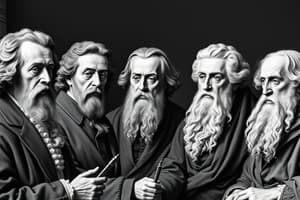Podcast
Questions and Answers
Which concept suggests that governments derive their power from the consent of the governed?
Which concept suggests that governments derive their power from the consent of the governed?
- Separation of powers
- Declaration of Independence
- Natural rights
- Consent of the governed (correct)
Who is primarily recognized for developing the idea of separation of powers?
Who is primarily recognized for developing the idea of separation of powers?
- Rousseau
- Montesquieu (correct)
- Voltaire
- John Locke
What document outlines limitations and laws on government power?
What document outlines limitations and laws on government power?
- U.S. Constitution (correct)
- Proclamation of 1763
- Dec. of The Rights of Man
- Spirit of Laws
Which Enlightenment thinker believed in the social contract and general will?
Which Enlightenment thinker believed in the social contract and general will?
What was the primary reason British colonists protested taxation from 1760 to 1776?
What was the primary reason British colonists protested taxation from 1760 to 1776?
Which of the following best describes the Enlightenment philosophers?
Which of the following best describes the Enlightenment philosophers?
Which branch of government is responsible for interpreting laws?
Which branch of government is responsible for interpreting laws?
What was the cultural belief during the Enlightenment regarding religion?
What was the cultural belief during the Enlightenment regarding religion?
Which event in 1804 involved the pursuit and killing of innocent French individuals in Haiti?
Which event in 1804 involved the pursuit and killing of innocent French individuals in Haiti?
Who was the Enlightenment-inspired leader that liberated most of South America from Spanish rule?
Who was the Enlightenment-inspired leader that liberated most of South America from Spanish rule?
What was the two-year period marked by tyranny and chaos during the French Revolution?
What was the two-year period marked by tyranny and chaos during the French Revolution?
Which document exemplifies Enlightenment ideals within the context of the French Revolution?
Which document exemplifies Enlightenment ideals within the context of the French Revolution?
Which leader was notable for leading the successful slave rebellion against France in 1792?
Which leader was notable for leading the successful slave rebellion against France in 1792?
What movement aimed at forming a national identity in the multiethnic Ottoman Empire?
What movement aimed at forming a national identity in the multiethnic Ottoman Empire?
What describes the struggle for Filipino independence from 1896 to 1898?
What describes the struggle for Filipino independence from 1896 to 1898?
Which series of reforms enacted in the Ottoman Empire aimed to eliminate discriminatory ethnic policies?
Which series of reforms enacted in the Ottoman Empire aimed to eliminate discriminatory ethnic policies?
Flashcards
Right of Revolution
Right of Revolution
This is the idea that if the government is not protecting the rights of citizens, and citizens have the obligation to reform or remove said government.
Natural Rights
Natural Rights
The belief that all humans are born with certain rights that governments cannot take away, such as the right to life, liberty, and property.
Constitution
Constitution
A document outlining the basic principles and laws that govern a nation.
Separation of Powers
Separation of Powers
Signup and view all the flashcards
Montesquieu
Montesquieu
Signup and view all the flashcards
Consent of the Governed
Consent of the Governed
Signup and view all the flashcards
Declaration of Independence
Declaration of Independence
Signup and view all the flashcards
Seven Years War
Seven Years War
Signup and view all the flashcards
Nationalism
Nationalism
Signup and view all the flashcards
Reign of Terror
Reign of Terror
Signup and view all the flashcards
Haitian Revolution
Haitian Revolution
Signup and view all the flashcards
Toussaint Louverture
Toussaint Louverture
Signup and view all the flashcards
White massacre
White massacre
Signup and view all the flashcards
Tanzimat Reforms
Tanzimat Reforms
Signup and view all the flashcards
Philippine-American War
Philippine-American War
Signup and view all the flashcards
Ottomanism
Ottomanism
Signup and view all the flashcards
Study Notes
Enlightenment Influences on Revolutions
- Enlightenment thinkers questioned the authority of governments and religion, advocating for natural rights and popular sovereignty.
- Key Enlightenment ideals include natural rights, consent of the governed, and the separation of powers.
- John Locke significantly influenced these ideals.
- Montesquieu proposed the separation of powers into legislative, executive, and judicial branches.
- Philosopher is a term for Enlightenment thinkers.
Documents and Philosophers
- Natural rights: The belief that all humans are born with rights to life, liberty, and property.
- Consent of the governed: The belief that governments derive their legitimacy from the consent of their people and have an obligation to protect rights.
- U.S. Constitution: A document that limited government power and established principles of government.
- Declaration of Independence: An American document that proclaimed the rights to life, liberty, and the pursuit of happiness and the right of rebellion against unjust governments.
- Voltaire: Enlightenment thinker who advocated for religious tolerance.
- Rousseau: Enlightenment thinker who emphasized the "general will" as a principle of government.
- Declaration of the Rights of Man: French Revolutionary document that proclaimed natural rights.
- French Constitution of 1791: French revolutionary document that established limits of government power.
Revolutions Inspired by Enlightenment Ideals
- American Revolution
- French Revolution
- Latin American Revolutions (e.g., Haitian Revolution)
Conflicts and Events
- Seven Years' War: Conflict where Great Britain, among other participants, defeated France in Canada and India.
- Proclamation of 1763: British law denying colonists land west of the Appalachian Mountains.
- Colonists' discontent: Taxation without representation fueled American discontent.
- Reign of Terror: Period of radical violence and tyranny during the French Revolution.
- Haitian Revolution: Successful slave rebellion against France. Toussaint Louverture led this rebellion.
- White massacre in Haiti: Event in 1804 where Haitian forces killed hundreds of remaining French.
- Nationalism: The belief that boundaries should be formed based on ethnicity, culture, race, or language.
Latin American Revolutions
- Simon Bolívar: Revolutionary leader in Latin America.
- Jamaica Letter: Document detailing Bolívar's Enlightenment views.
- Gran Colombia: New states formed by Bolívar.
- José de San Martín: Revolutionary who led Argentine and South American liberation.
- Philippine Revolution: Struggle for independence from Spain.
- Philippine-American War: War between Filipino nationalists and American forces.
Ottoman Empire
- Ottomanism: Movement to form a national identity within the Ottoman Empire.
- Tanzimat Reforms: Series of reforms in the Ottoman Empire to remove discriminatory policies.
- Upset by reforms: Muslims were upset by the reforms.
- First Balkan War: Conflict in 1912 in which Balkan states took further holdings from the Ottoman Empire.
Unification of States
- Note: The question asks for two examples, but only one example (Germany and Italy) is provided in the list.
Studying That Suits You
Use AI to generate personalized quizzes and flashcards to suit your learning preferences.




